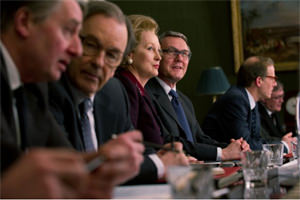‘The Iron Lady’: Power in Spectator Pumps
Do we learn anything about Margaret Thatcher from Abi Morgan’s screenplay? And more important, will anyone born after Thatcher’s 11 years in office learn anything about her brand of conservatism and its effects?Nothing like a movie to drive a wedge between ideology and feelings.
Nothing like a movie to drive a wedge between ideology and feelings. I remember that wedge’s painful thrust watching “Nixon,” Oliver Stone’s tragedy about the 37th president, a polarizing figure who I had been bred, in utero, to despise — yet there I was, empathizing with him for the better part of three hours and 12 minutes. I felt it again, if not so acutely, during Phyllida Lloyd’s “The Iron Lady,” a flinty profile of Margaret Thatcher, England’s 49th prime minister and the first woman elected leader of a Western democracy. My responses were so contradictory that I can account for them only by transcribing the interior dialogue scribbled in my notebook.
As the film toggled between the Alzheimer’s-addled twilight of Baroness Thatcher, shuffling through her apartment in carpet slippers, and key scenes from the high noon of her ministry, where she resembles Athena clad in a bouffant helmet and spectator pumps, my responses likewise alternated between aversion and sympathy.
In truth, the fluctuations of emotion commenced as I walked into the theater. Not fond of filmmaker Lloyd, the stage director responsible for both West End and Hollywood iterations of “Mamma Mia!” (with $600 million in box office receipts, the most commercially successful film by a woman). I’m always happy when a movie connects with an audience, even happier when it’s by a woman. But still, “Mamma Mia”? And now, Mama Maggie? I’m fond of Meryl Streep, but good golly, with Julia Child, Isak Dinesen, Nora Ephron, Carrie Fisher and Karen Silkwood thus far, can Streep play someone other than a boldface name?
Soon after the lights go down, I have to admit that Lloyd’s Thatcher portrait is more polished than her rendition of the ABBA jukebox musical. This is faint praise. On the plus side, Lloyd doesn’t frame every scene as though it’s being played under a proscenium arch. On the minus, her establishing shots come in two perspectives, extreme-high-angle, as though God is looking down upon Baroness Thatcher; and extreme low-angle, obliging audiences to look up to Herself. And Streep, magnificent. She understands that impersonation is not acting. Even while playing the aged Thatcher diminished by dementia, Streep conveys an undiminished authority.
Abi Morgan (whose other controversial scenario in 2011 was “Shame,” with Michael Fassbender playing a sex addict) wrote “The Iron Lady.” Whatever you think of her, Thatcher had spine. Not so Morgan’s impressionistic screenplay, which opens in the indefinite present, with the former PM flashing back to her unassuming origins and parliamentary triumphs, then back again to her imaginary conversations with her long-dead spouse, Denis (jolly Jim Broadbent). Morgan’s script has a framing device that one might call the Tempest and the teacup: When Denis proposes, resolute young Margaret says yes, please. But she stipulates that he must support her career: “One’s life must matter. I cannot die washing up a teacup.” Well, guess how the movie closes.
Do we learn anything about Thatcher from Morgan’s screenplay? And more important, will anyone born after Thatcher’s 11 years in office learn anything about her brand of conservatism and its effects? Lloyd and Morgan provide the bullet points from the prime minister’s three terms, an anti-union position here, pro-deregulation stance there, the poll-tax riots and yes, the Falkland invasion. But one who knows little about British politics or geopolitics between 1979 and 1990 will be mystified by the lack of context and utter failure of the filmmakers to connect Thatcher’s convictions with these positions.
“The Iron Lady” comes neither to praise Thatcher nor to bury her. The considerable imaginative sympathy of the filmmakers and their lead actress is toward one purpose: to make the moviegoer walk in the (sensible) shoes of she who boldly strode where no woman has gone before, to experience the full force of female power. The sight of Thatcher’s pumps in the line of men’s wingtips queuing up to enter Parliament delivers a simultaneous jolt of adrenaline and estrogen. As does the overhead shot of her peacock-blue chapeau among a sea of shiny bald heads.
The unyielding Streep plays it not to the hilt, but to the armpit as the once-belittled seedling who becomes the tall poppy. Her Thatcher masters her social awkwardness and fear, is unafraid to stand up and stand out, unafraid to talk over men who do not succeed in interrupting her. As the uncompromising Thatcher, human ramrod, Streep made me sit taller and straighter. As the first prime minister in British history who was also a mother, she made me cry as she shows the PM handwriting condolence letters to the parents of soldiers who died in the Falklands. Hated the war, moved by the grief.
Regrettably, “The Iron Lady” does not include my favorite Thatcher anecdote. When she served in the cabinet of Prime Minister Edward Heath, he disparaged a candidate for BBC chair by remarking, “He’s got a much too high opinion of himself.” From the end of the table Thatcher interrupted, “Well, most men do, Mr. Prime Minister.” The parts of “The Iron Lady” that were most effective for me distill that Thatcher self-assurance and wit.
Would Thatcher appreciate the irony that by the film’s end, as she’s rinsing that teacup — I had developed feelings toward the political figure I had for decades reviled? Or would she have harrumphed, as she does in the film when her doctor asks how she feels, “One of the great problems of our age is that we’re governed by people who care more about feelings than they do about thoughts and ideas”?
I strongly suspect the latter. And I wish the film about her had wrestled as much with her thoughts and ideas as it did with her feelings.
Your support matters…Independent journalism is under threat and overshadowed by heavily funded mainstream media.
You can help level the playing field. Become a member.
Your tax-deductible contribution keeps us digging beneath the headlines to give you thought-provoking, investigative reporting and analysis that unearths what's really happening- without compromise.
Give today to support our courageous, independent journalists.









You need to be a supporter to comment.
There are currently no responses to this article.
Be the first to respond.